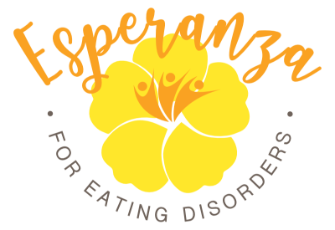
Eating Disorder Treatment
Our programs are GENDER INCLUSIVE AND PROVIDE TREATMENT BEGINNING AT AGE 13+ for all types of eating disorders including Anorexia, Bulimia, Binge Eating Disorder, Avoidant Restrictive Food Intake Disorder (ARFID) and Otherwise Specified Feeding and Eating Disorder (OSFED).
Receiving treatment at the right level of care at the right time is so important for eating disorder patients to successfully heal mind, body and spirit. At Esperanza, having the consistency of one therapist throughout all levels of care enhances the atmosphere of security and clinical continuity at the heart of all our programs.
Treatment is coordinated and provided by a multidisciplinary team of medical, clinical and dietary providers. At EEDC, the treatment team is comprised of the Medical Director, Executive Director, Psychiatric Nurse Practitioner, Nurse, Mental Health Clinicians (LPC, LMSW, clinical interns), and Registered Dietitians.
Evidence based therapies including CBT, DBT and ACT provide patients at all levels of care with a wide range of skills to guide them to a life of fulfilling recovery.
Recovery by Doing is part of every level of care at Esperanza.
In the kitchen, grocery store, restaurant and at the dinner table, we practice doing recovery to reinforce skills learned each day.
Cooking classes, learning to make a variety of selections at the grocery store, practicing eating in restaurants and ordering meals for delivery are all Recovery by Doing activities designed to help patients become comfortable participants in these important real-life situations.
For adolescents, therapeutic meals with parents and clinicians help parents learn to support their teen and give the teen practice using skills to help make mealtime more enjoyable for everyone.
Click to read a research article from eating disorder specialist Jillian Lampers, PhD, MHP, RD, LD, FAED, on the Levels of Care Guidelines for Individuals with Eating Disorders.
Integrative therapies including guided imagery meditation, mindful movement and creative arts are all part of Recovery by Doing.
Click to see descriptions of the evidence based and integrative therapy groups that are part of the healing process at Esperanza.
Levels of Care
Partial Hospitalization Programs (PHP)
These programs are for medically stable patients. Patients participate in up to 10 1/2 hours of structured programming per day, up to five days per week. This level of care is for those who need dietary structure for meals, weight restoration and symptom control. Patients have three therapeutic meals and two snacks per day and participate in a variety of evidence-based therapy groups, experiential behavioral activities and hands on nutrition education and exposure experiences. Weekends and evenings allow for practicing skills in the home environment.
Learn More:
Adult PHP
Adolescent PHP
Intensive Outpatient Programs (IOP)
This level of care provides up to 4 hours of structured programming per day, up to five days per week. This level of care is appropriate for those who benefit from continued structure and emotional support provided in the therapeutic community, but who exhibit independent eating behaviors and symptom control. Patients experience continued growth in independence while continuing to receive support and security in the program.
Learn More:
Adult IOP
Adolescent IOP
Be Free IOP
Outpatient
Patients in outpatient treatment can manage their own meals and experience minimal eating disorder behaviors. They have developed a support network outside of Esperanza and are motivated to continue to work on the process of recovery. Esperanza offers individual outpatient services for patients who have completed treatment and who do not have a therapist in the community. Referrals to eating disorder therapists and dietitians in the community are also available.

Our Nutrition Philosophy
The nutrition team at Esperanza understands that eating disorders are not “just about the food.” We acknowledge the complex role that nutrition plays throughout the recovery process, and we believe that all foods can be included in a balanced lifestyle. Our dietary team provides gentle guidance throughout meal times, from preparation to finishing the last bite. We provide nutrition education and individual nutrition sessions to our patients to help them understand their body’s needs and empower them to take ownership of their recovery. We also provide support to our patient’s families. Our dedicated, compassionate nutrition staff is here to help our patients heal their relationship with food and find freedom from obsessive worrying about food and appearance.

